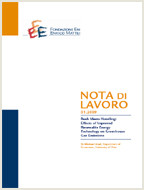Implications of Weak Near-term Climate Policies on Long-term Mitigation Pathways

Data
29.01.2015
29.01.2015
Autori
Gunnar Luderer (Potsdam Institute for Climate Impact Research); Christoph Bertram (Potsdam Institute for Climate Impact Research); Katherine Calvin (PNNL); Enrica De Cian (Fondazione Eni Enrico Mattei); Elmar Kriegler (Potsdam Institute for Climate Impact Research)
Codice JEL
Q5, Q58
Q5, Q58
Parole chiave:
Climate Change, Mitigation
Climate Change, Mitigation
Publisher
Climate Change and Sustainable Development
Climate Change and Sustainable Development
Editor
Carlo Carraro
Carlo Carraro
While the international community has agreed on the long-term target of limiting global warming to no more than 2°C above pre-industrial levels, only a few concrete climate policies and measures to reduce greenhouse gas (GHG) emissions have been implemented.
We use a set of three global integrated assessment models to analyze the implications of current climate policies on long-term mitigation targets. We define a weak-policy baseline scenario, which extrapolates the current policy environment by assuming that the global climate regime remains fragmented and that emission reduction efforts remain unambitious in most of the world’s regions. These scenarios clearly fall short of limiting warming to 2°C.
We investigate the cost and achievability of the stabilization of atmospheric GHG concentrations at 450 ppm CO2e by 2100, when countries follow the weak policy pathway until 2020 or 2030 before pursuing the long-term mitigation target with global cooperative action. We find that after a deferral of ambitious action the 450 ppm CO2e is only achievable with a radical up-scaling of efforts after target adoption. This has severe effects on trans-formation pathways and exacerbates the challenges of climate stabilization, in particular for a delay of cooperative action until 2030. Specifically, reaching the target with weak near-term action implies (a) faster and more aggressive transformations of energy systems in the medium term, (b) more stranded investments in fossil-based capacities, (c) higher long-term mitigation costs and carbon prices and (d) stronger transitional economic impacts, rendering the political feasibility of such pathways questionable.
***
Suggested citation: Gunnar Luderer, Christoph Bertram, Katherine Calvin, Enrica De Cian and Elmar Kriegler, “Implications of weak near-term climate policies on long-term mitigation pathways”, Climatic Change, October 2013, DOI 10.1007/s10584-013-0899-9.
